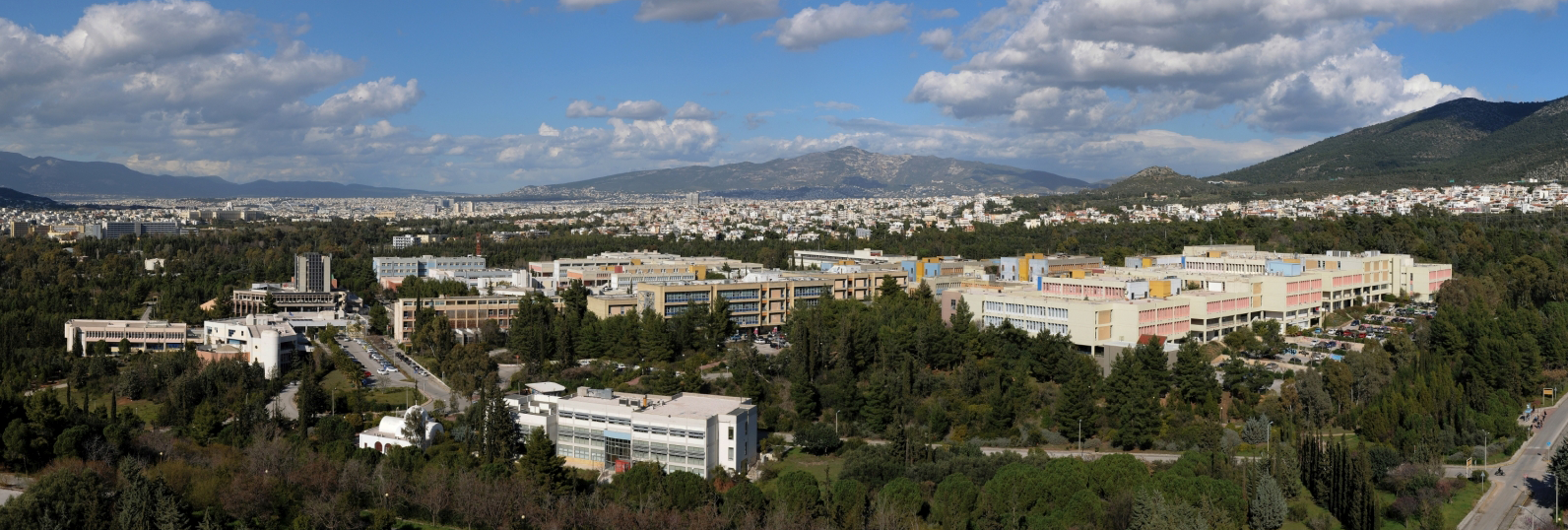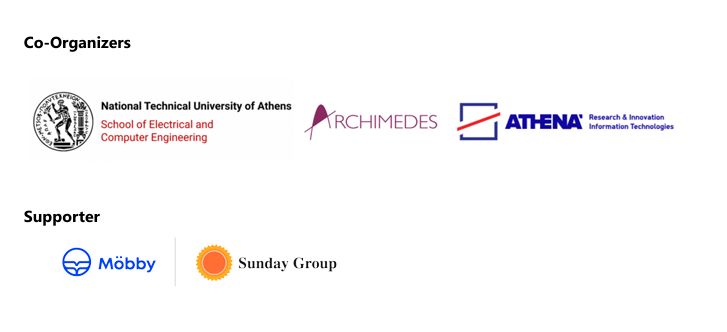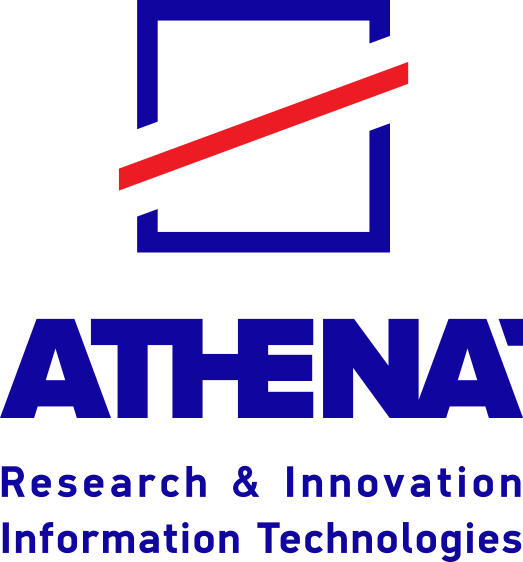2025 Archimedes Summer School on Blockchain, Economics, and AI

Home
This summer school is being organized by Archimedes ( https://archimedesai.gr/en/), Athena Research Center ( https://www.athenarc.gr/en/home), Greece , the School of Electrical & Computer Engineering ( https://www.ece.ntua.gr/en) of the National Technical University of Athens (NTUA), Greece, and is being supported by Mobby.ai ( https://www.mobby.ai/).
The purpose of this summer school is to bring together leading experts and interested researchers in the fields of Blockchain, Economics, and Artificial Intelligence, and to provide the opportunity for young and experienced coders to participate in a hackathon with blockchain challenges.
Program
Duration: 3 days - May 22-24, 2025
Place: National Technical University of Athens (NTUA) premises, Multimedia Amphitheater, Central Library Ground Floor, Athens, Greece
Registration link here: https://forms.gle/2UG6kPTH4wCbCLKg6
Day 1 (Thursday, May 22):
Focus on Blockchain, Foundations, and Distributed Ledger Technologies Chair: Vassilis Zikas, School of Cybersecurity and Privacy, Georgia Tech, USA & Archimedes, Athena Research Center, Greece & Mobby.ai
9:00 – 9:50:
Coffee & Cookies will be available
9:50 – 10:00:
Opening Remarks
Aris Pagourtzis, School of Electrical and Computer Engineering, NTUA, Greece & Archimedes, Athena Research Center, Greece
Vassilis Zikas, School of Cybersecurity and Privacy, Georgia Tech, USA & Archimedes, Athena Research Center, Greece & Mobby.ai
10:00 – 11:30:
Lecture 1 - “Cryptographic Foundations of Blockchains”
Juan Garay, Department of Computer Science & Engineering, Texas A&M University, USA & Global Cyber Research Institute Texas A&M University, USA
11:30 – 12.00:
Coffee Break
12.00 – 1:30:
Lecture 2 - “From Distributed Computing to Blockchain”
Ran Cohen, Efi Arazi School of Computer Science, Reichman University, Israel & FACT (Foundations and Applications of Cryptographic Theory) Research Center, Israel
1.30 – 3.30:
Lunch (Catered)
3:30 – 5:00:
Lecture 3 - “Blockchains based on Different Resources”
Michele Ciampi, School of Informatics, University of Edinburgh, UK & Laboratory for Foundations of Computer Science, UK
5:00 – 5.30:
Coffee Break
5.30 – 6.00:
Students' Talks
Day 2 (Friday, May 23):
9:00 – 10.00:
Coffee & Cookies will be available
10.00 – 11.00:
Lecture 4 - “Cryptography and Game Theory”
Athina Terzoglou, Department of Computer Science, Purdue University, USA
11.00 – 12.00:
Lecture 5 - “Reputation Games & Applications to Proof of Reputation”
Vassilis Zikas, School of Cybersecurity and Privacy, Georgia Tech, USA & Archimedes, Athena Research Center, Greece & Mobby.ai
12.00 – 12:30:
Coffee Break
12:30 – 2:00:
Lecture 6 - “Crypto Economics”
Julien Prat, Researcher at CNRS-CREST (Center for Research in Economics and Statistics) & Blockchains and Platforms at École Polytechnique, France
2:00 – 3.30:
Lunch (Catered)
3:30 – 4:30:
Lecture 7 - “Pool Formation in Oceanic Games: Shapley Value and Proportional Sharing”
Evangelos Markakis, Department of Informatics, Athens University of Economics and Business, Greece & Archimedes, Athena Research Center, Greece
4.30 – 5.30:
Research Talks on Blockchain and Economics (Students & Participants)
Day 3 (Saturday, May 24):
Training Sessions & Hackathon
Chair: Muhammad Ishaq, Mobby.ai
10.00 – 11.00:
Session 1 - “Session for Setting-up and Testing Hackathon Environment”
Muhammad Ishaq, Chief Technology Officer at Mobby.ai
Dimitris Starantzis, System Software Engineer at Mobby.ai
11.00 – 12:30:
Session 2 - “Training Session on Hackathon”
Muhammad Ishaq Malik, Chief Technology Officer at Mobby.ai
Dimitris Starantzis, System Software Engineer at Mobby.ai
12:30 - 4.00:
Lunch (Catered) & Hackathon
Lecturers & Speakers
Vassilis Zikas
Vassilis Zikas is an associate professor at the School of Cybersecurity and Privacy (SCP) at Georgia Tech, USA and an affiliated researcher at Archimedes, Athena Research Center, Greece. Prior to joining SCP, Vassilis was an associate professor of Computer Science and Director of the Purdue Blockchain Lab at Purdue University, USA.
He has also served as an associate professor at the School of Informatics of the University of Edinburgh, UK, and Vice-Director of its Blockchain Technology Lab, and an assistant professor at Rensselaer Polytechnic Institute (RPI), USA.
He is one of the pioneers in the blockchain and decentralization research, and has been affiliated with (and supported by) top blockchain and cryptocurrency companies. Indicatively, he was research fellow and area leader of IOG (formerly known as IOHK), where as a member of its core research team he co-developed the basis for the decentralization of its flagship Cardano blockchain - holding a top-ten cryptocurrency. He is currently the Chief Scientist of Sunday Group, and the lead architect of its flagship Mobby blockchain.
In the past he was a fellow of the Simons Institute, UC Berkeley, USA, and a Swiss NSF fellow. His work is supported by government agencies both in the US (NSF, DoD) and in Switzerland (Swiss NSF), and by the blockchain industry, including multi-million faculty gifts and grants by Sunday Group and the Algorand Foundation.
- Georgia Tech webpage: https://www.cc.gatech.edu/people/vassilis-zikas
- Personal webpage: https://faculty.cc.gatech.edu/~vzikas/
- Archimedes, Athena Research Center profile: https://archimedesai.gr/en/researchers/vassilis-zikas
- Mobby.ai profile: https://www.mobby.ai/about/our-people/vassilis-zikas#biography
- Google Scholar profile: https://scholar.google.com/citations?user=bsFxGUIAAAAJ&hl=el
Aris Pagourtzis
Aris Pagourtzis is a Professor of Computer Science at the School of Electrical and Computer Engineering of National Technical University of Athens (NTUA), head of the Computer Science Division and a lead researcher at Archimedes, Athena Research Center, Greece. He holds a Diploma in Electrical Engineering (1989) and a Ph.D. in Electrical and Computer Engineering (1999), both from the National Technical University of Athens, Greece.
He has held academic posts at the University of Ioannina, Greece, the University of Liverpool, UK, the ETH Zuerich, Switzerland, the National and Kapodistrian University of Athens, Greece, and the Athens University of Economics and Business, Greece.
He has co-authored four books on foundations of computer science, distributed computing, and cryptography, and more than eighty scientific publications. His main contributions lie in the areas of network algorithms, distributed computing, approximation algorithms, counting complexity and cryptography.
He has served in the program and organizing committee of various theoretical computer science and cryptography conferences, co- chairing CIAC 2017 and FCT 2021. His research has often been funded by grants from the US, UK, France, EU, and national resources.
He has been invited several times as a visiting researcher to universities in Europe and US, namely the University of Paris-Dauphine, France, the University of Liverpool, UK, King’s College London, UK, and the University of Rochester, USA, among others.
Juan Garay
Since Fall ’17, Juan Garay has been a full professor at Texas A&M University’s Computer Science & Engineering Department, and currently he is also an Associate Director for Texas A&M’s Global Cyber Research Institute, USA. Previously, after receiving his PhD in Computer Science from Penn State, USA, he did a postdoc at the Weizmann Institute of Science (Israel), and held research positions at the IBM T.J. Watson Research Center, Bell Labs, AT&T Labs–Research, and Yahoo Labs, in the US.
His current research interests include both foundational and applied aspects of cryptography and information security. In more detail, they include cryptographic protocols and schemes, secure multiparty computation, blockchain protocols and cryptocurrencies, cryptography and game theory, distributed computing, consensus problems, and algorithms.
He has co-authored over 190 works (including articles, patents, and edited volumes) in the areas of cryptography, network security, distributed computing, and algorithms. Besides numerous contributions of a foundational nature to the area of cryptographic protocols and schemes (secure multi-party computation, verifiable secret sharing, oblivious transfer and commitment schemes, zero-knowledge, timed- release cryptography, “rational” cryptography, Byzantine agreement and consensus protocols, blockchain protocols), he has been involved in the design, analysis and implementation of a variety of secure systems, and he has been the recipient of a Thomas A. Edison Patent Award, two Bell Labs Teamwork Awards, an IBM Outstanding Technical Achievement Award, and an IBM Research Division Award. In 2018 he became a Fellow of the International Association for Cryptologic Research (IACR).
Ran Cohen
Ran Cohen is a faculty member at the Efi Arazi School of Computer Science at Reichman University (formerly IDC Herzliya), in Israel. He is an associate director of the FACT (Foundations and Applications of Cryptographic Theory) research center.
Before joining Reichman University, Israel he was a principal research scientist at the Khoury College of Computer Sciences at Northeastern University, USA. Prior to that, he spent two great years as a post- doctoral researcher in the Boston area, working with Shafi Goldwasser at MIT CSAIL, with Abhi Shelat at Northeastern University, USA and with Ran Canetti at Boston University, USA and before that he spent a wonderful year working with Iftach Haitner at the Tel Aviv University, Israel.
He completed his Ph.D. In 2016, working at the Cryptography Research Group at Bar-Ilan University, Israel where he was very fortunate to have Yehuda Lindell as his advisor. He received his M.Sc. from the Department of Mathematics at Bar-Ilan University, Israel, under the supervision of Boris Kunyavskii working on Algebraic Geometry.
His research interests are in cryptography and its synergy with distributed computing, mainly focusing on secure multiparty computation and consensus protocols.
- Reichman University webpage: https://www.runi.ac.il/en/faculty/rcohen01/
- Personal webpage: https://cs.idc.ac.il/~ran/
- Google Scholar profile: https://scholar.google.com/citations?user=j7qxKSgAAAAJ&hl=en
Athina Terzoglou
Athina Terzoglou is a third-year PhD student in the Department of Computer Science at Purdue University, USA, where she is fortunate to be advised by Prof. Alex Psomas and she will be a 2025 summer research intern at Archimedes, Athena Research Center, Greece.
She is broadly interested in theoretical computer science and more specifically in algorithmic game theory, mechanism design, and cryptography. She completed her undergraduate studies at the National Technical University of Athens in Greece, where she was advised by Prof. Dimitris Fotakis.
- Personal webpage: https://sites.google.com/view/athinaterzoglou
- LinkedIn profile: https://www.linkedin.com/in/athina-terzoglou-114bb018b/
- Google Scholar profile: https://scholar.google.com/citations? user=N0LpOZoAAAAJ&hl=en
Julien Prat
Julien Prat is an economist working on blockchains, mechanism design, contract theory, and macroeconomics. He is a 2004 PhD graduate from the economics department of the European University Institute, Italy. He is currently working as a CNRS director of research at CREST (Center for Research in Economics and Statistics), and an associate professor at the École Polytechnique, France.
Previously, he held assistant professorship positions at the University of Vienna, Austria, and at the Institute for Economic Analysis (CSIC) in Barcelona, Spain.
Julien has published in top international scientific journals such as the Journal of Political Economy, Management Science, Journal of the European Economic Association, Journal of Economic Theory, and the Economic Journal.
- CNRS-CREST webpage: https://crest.science/user/julien-prat/
- Personal webpage: https://sites.google.com/site/julienpratecon/home
- Google Scholar profile: https://scholar.google.fr/citations?user=WIq_nd0AAAAJ&hl=en
Evangelos Markakis
Evangelos Markakis has been a faculty member, currently a Professor, in the department of Informatics of the Athens University of Economics and Business, Greece, since 2009, and a lead researcher at Archimedes, Athena Research Center, Greece. He received his M.Sc. (2004) and Ph.D. degree (2005) in computer science from the Georgia Institute of Technology, USA.
Following that, he worked as a postdoctoral researcher at the University of Toronto (Canada, 2005-2006) and at CWI (Center for Mathematics and Computer Science, the Netherlands, 2007-2008). He has also held research appointments with Stanford University, USA (visiting scholar, Spring 2014) and Input Output Global (research fellow, Fall 2022- Summer 2023).
His research interests lie in theoretical computer science and algorithmic game theory, with an emphasis on resource allocation problems, mechanism design, and more broadly on algorithms for combinatorial optimization. He has also participated as a management committee member in EU networks on related topics and in several basic research projects funded by the EU and by the Greek State.
- AUEB webpage: https://www.aueb.gr/el/faculty_page/%CE%BC%CE%B1%CF%81%CE %BA%CE%B1%CE%BA%CE%B7%CF%83-%CE%B5%CF%85%CE%B1%CE%B3%CE%B3%CE %B5%CE%BB%CE%BF%CF%83
- Personal webpage: http://pages.cs.aueb.gr/~markakis/
- Archimedes, Athena Research Center profile: https://archimedesai.gr/en/researchers/evangelos-markakis
- Google Scholar profile: https://scholar.google.gr/citations?user=VDyjbagAAAAJ&hl=en
Muhammad Ishaq
Muhammad Ishaq (Malik) has over 10 years of experience in the software industry. He has worn many hats; those of software engineer, team leader, manager and co-founder. He is currently the Chief Technology Officer (CTO) of Mobby.ai, the advanced blockchain platform of Sunday Group.
Before joining Sunday Group, he was a senior researcher and project manager at Purdue University, USA where he also completed my Ph.D. in Computer Science.
His primary areas of focus are Blockchain and Decentralized Finance (DeFi) and Multiparty Computation (MPC).
- Mobby.ai profile: https://www.mobby.ai/about/our-people/muhammad-ishaq
- LinkedIn profile: https://www.linkedin.com/in/ishaqmalik/
Dimitris Starantzis
Dimitris Starantzis is a Blockchain Software Engineer at Mobby.ai.
Prior to joining Mooby.ai he was employed as a junior software engineer at Neuropublic SA, in Athens, Greece were he designed, developed and implemented a table olive supply chain traceability system leveraging blockchain technology.
He is particularly passionate about the future of Blockchain Technology from back in the days of his Diploma Project at the National University of Athens, Greece and he is constantly seeking opportunities to contribute and stay at the forefront of this evolving field!
- LinkedIn profile: https://www.linkedin.com/in/dimitris-starantzis-756968180/
Registration
There are no registration fees for this event.
However, participants are required to register for administrative purposes by completing the summer school's registration form found below. Please register as early as possible.
Due to space constraints, a limited number of seats are available and once capacity is reached registration will be closed.
Participants will also have the option to register for the hackathon which will take place in day 3. This hackathon has been described as "a 4-hour coding challenge, packed with problems in Rust programming & Blockchain concepts!". It is an ideal opportunity for both a beginner or a seasoned coder, so don't miss the opportunity to participate in this hackathon and receive free training from professionals.
Registration link here: https://forms.gle/2UG6kPTH4wCbCLKg6
Venue
The Archimedes Summer School on Blockchain, Economics, and AI will take place at the Multimedia Amphitheater, Central Library Ground Floor, Zografos campus of the National Technical University of Athens (NTUA), Greece.

You can arrive at the Multimedia Amphitheater, Central Library Ground Floor, Zografos campus building of the NTUA in various ways:
By public transport: The easiest way is by taking the Blue Metro line and getting off at the "ΚΑΤΕΧΑΚΗ" station. Then take the bus 242, get off at stop "ΘΥΡΩΡΕΙΟ" and walk 7 minutes towards the Administration Building("ΚΤΗΡΙΟ ΔΙΟΙΚΗΣΗΣ"). Another option is to take the bus 140 from the "ΚΑΤΕΧΑΚΗ" metro station and get off at stop "ΠΟΛΥΤΕΧΝΕΙΟΥΠΟΛΗ". Then get into the campus and walk 12 minutes towards the Administration Building.
By car: You can use this google map to get directions from Alimou-Katechaki Avenue.
Organizing & Scientific Committee
Aris Pagourtzis, School of Electrical and Computer Engineering, NTUA, Greece & Archimedes, Athena Research Center, Greece
Vassilis Zikas, School of Cybersecurity and Privacy, Georgia Tech, USA & Archimedes, Athena Research Center, Greece & Mobby.ai
Organization
Giannis Pavlovic, Archimedes, Athena Research Center, Greece
Dimitris Lazarou, Archimedes, Athena Research Center, Greece
Co-Organizers
Archimedes ( https://archimedesai.gr/en/), Athena Research Center ( https://www.athenarc.gr/en/home), Greece
The School of Electrical & Computer Engineering ( https://www.ece.ntua.gr/en) of the National Technical University of Athens (NTUA), Greece
Supporter
Mobby.ai (hyperlink: https://www.mobby.ai/) (Sunday Group)






